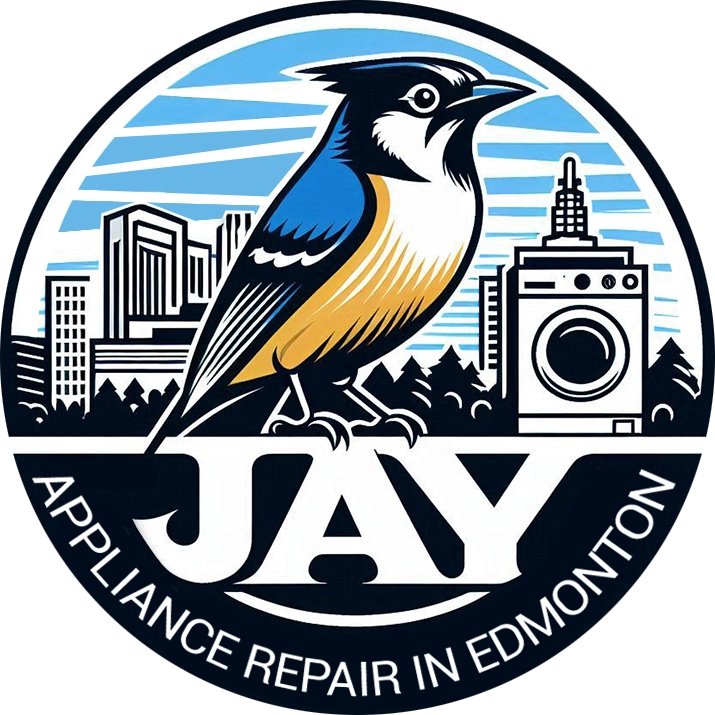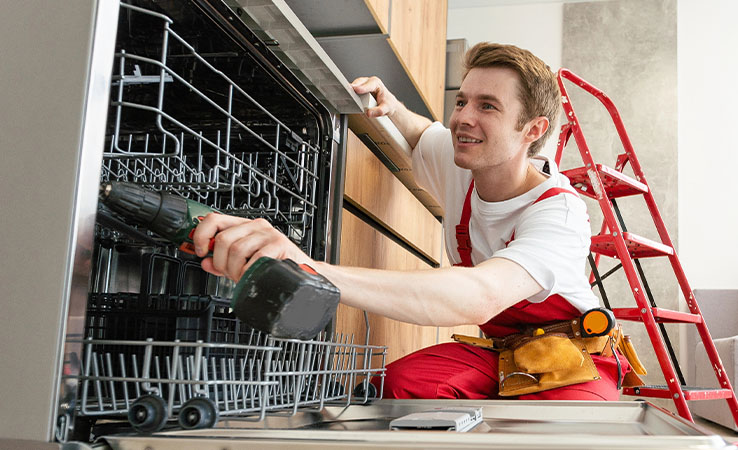When our dishwasher or washing machine makes an unusual grinding or humming sound, it usually signals that something is not working as it should. At JAY Appliances we see this issue often, and it can come from different sources within the pump motor system. Understanding why these noises happen helps us decide if it is a simple fix or if professional help is needed.
What the Pump Motor Does
First we should look at the purpose of the pump motor. This part is responsible for moving water in and out during cycles. In dishwashers it drains dirty water and circulates clean water over the dishes. In washing machines it empties the tub after a wash or rinse. When the motor runs smoothly, we hardly notice it. When it starts to grind or hum, it means the movement of the impeller or the motor shaft is facing resistance. That resistance can damage the appliance over time, so it is best to investigate early.
Common Causes of Grinding Noises
Sometimes a grinding noise means something solid has made its way inside the pump housing. Pieces of broken glass, seeds, or even small bits of plastic can get lodged near the impeller blades. As the motor turns, the blades scrape against the object and create the grinding sound. Another possible cause is a worn bearing. Bearings allow the motor shaft to rotate freely. Once they wear down, the smooth turning motion changes to a harsh grinding. Ignoring this can lead to complete motor failure. Our team has also seen grinding caused by bent or cracked impellers. The blades strike against the housing walls, which produces a harsh metallic sound.
Common Causes of Humming Noises
In other cases, the pump motor does not grind but instead makes a low humming noise. This often happens when the motor is trying to spin but cannot move freely. A clogged pump, a stuck impeller, or a jammed drain hose can all cause humming. The sound can also come from electrical problems such as a failing capacitor. This part helps the motor start its rotation. When it fails, the motor may only hum without spinning. We should also mention that humming can happen if the appliance is overloaded, since extra weight puts strain on the motor.
Diagnosing the Source of the Sound
Identifying whether the issue is grinding or humming is the first step. To narrow it down further, we can listen closely to where the sound comes from. Grinding usually has a sharper tone and may be accompanied by reduced water flow. Humming is deeper and continuous, often with no water movement at all. Checking the filter and drain area can reveal if debris is blocking the pump. If we cannot see anything obvious, unplugging the appliance and manually turning the impeller can show if it spins freely. If it feels stuck, there is likely a physical obstruction or a motor fault.
Risks of Ignoring Motor Noises
Leaving the problem unsolved carries risks. A grinding pump can shred the impeller or wear down the motor shaft until it seizes. A humming motor that fails to rotate will eventually overheat. Heat can damage the wiring and trip the circuit breaker. In both cases, ignoring the problem may turn a minor repair into a full replacement. We always remind people that water left standing in the tub from a failed pump can create leaks, mold growth, or even electrical hazards. Acting quickly saves both money and stress.
When to Try Fixes Yourself
There are a few checks we can try before calling for service. Removing and cleaning the filter basket is one of the simplest steps. Many grinding issues vanish once bits of food or debris are cleared out. Inspecting the drain hose for kinks or clogs is another easy task. If the hose is clear and the noise continues, we can try resetting the appliance by unplugging it for a few minutes. This sometimes resolves minor control board errors that affect the pump cycle. However, if the sound persists, the problem is likely mechanical or electrical and may need professional attention.
Professional Diagnosis and Repair
Some pump motor issues require tools and knowledge that go beyond basic checks. For example, replacing bearings or testing capacitors involves disassembly and electrical work. In those cases our team at JAY Appliances recommends seeking professional help. If you need detailed dishwasher service, the option for dishwasher repair in Vancouver is available. A trained technician can confirm whether the pump needs cleaning, repair, or replacement. Handling the issue early prevents secondary damage to other parts like seals and wiring.
Preventing Future Pump Motor Problems
Prevention is as important as fixing existing issues. We can reduce the risk of grinding by rinsing off large food scraps before loading the dishwasher. For washing machines, checking pockets for coins or small objects helps protect the pump. Cleaning the filter every few weeks ensures water flows without resistance. Running a cleaning cycle with hot water and a machine-safe cleaner keeps grease from building up. We should also avoid overloading appliances since heavy loads strain the pump motor. A little routine care goes a long way in keeping the motor running quietly.
How Long Pump Motors Usually Last
Pump motors do not last forever, but with proper care they often run for many years. In dishwashers, a pump motor can last seven to ten years. In washing machines the life span is similar. Longevity depends on water quality, regular cleaning, and load size. Hard water can cause mineral buildup inside the housing, which makes the motor work harder. Using a water softener where needed can help. Replacing filters as recommended by the manufacturer is another way to extend the life of the pump.
Signs That It Is Time for Replacement
Even with the best maintenance, motors eventually wear out. If we hear both grinding and humming together, it usually means the motor is failing completely. Repeated tripping of the breaker or constant overheating are also signs. Another indicator is water not draining at all even though the cycle seems to complete. At that stage, replacing the pump motor may be the only solution. It is better to act quickly rather than risk water damage from a failed drain cycle.
Safety Tips While Inspecting Pump Motors
Whenever we inspect a pump motor, safety must come first. Always unplug the appliance before touching any internal parts. Water and electricity are a dangerous combination, so ensuring the area is dry is essential. Using gloves can protect our hands from sharp edges around the filter housing. If the appliance is heavy, it is safer to have another person help move it before checking underneath. Following these steps keeps the inspection process safe and avoids accidental shocks or injuries.
Extra Insight: How Electrical Problems Affect Motors
One factor many people overlook is the role of voltage supply. If the household outlet provides inconsistent voltage, it can cause both grinding and humming sounds in motors. A motor struggling with unstable current may vibrate excessively, leading to noise. We can test this by plugging the appliance into another outlet or having an electrician check the circuit. If voltage is the cause, fixing the electrical supply prevents further damage. This tip is less common but can save us from replacing a motor unnecessarily.
Practical Step to Take Now
If you have been hearing these noises and want to make sure the problem is handled correctly, the best step is to book service with a trusted team. For full support, you can reach JAY Appliances directly through appliance repair in Vancouver. Acting now ensures the appliance is back to normal quickly and safely.
Frequently Asked Questions
Why does my dishwasher make a grinding noise at the start of a cycle?
It often means debris has reached the impeller area. Cleaning the filter and checking the pump housing usually resolves it.
Is a humming pump motor dangerous?
A humming motor is not instantly dangerous, but it can overheat if left running. That heat may damage wiring or the motor itself.
Can I lubricate a noisy pump motor?
No, these motors are sealed and do not allow lubrication. If the bearings are worn, the part usually needs replacement.
How can I tell if the noise is from the pump or another part?
Listen for the location and type of sound. Pump noises are near the bottom of the appliance and occur during draining or circulation.
What should I do if cleaning does not stop the noise?
If cleaning the filter and hose does not solve it, the motor likely has internal wear. At that point, replacement is often the solution.
For further assistance or to schedule a repair, you can contact us and our team at JAY Appliances will help you resolve the issue quickly.

